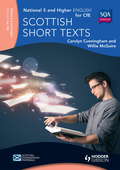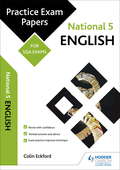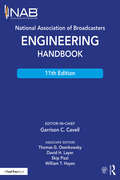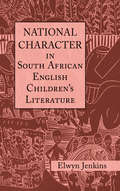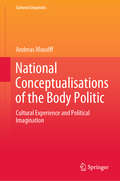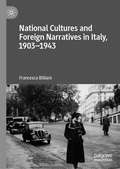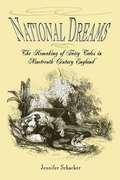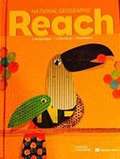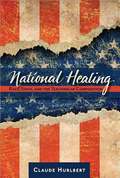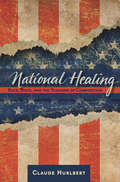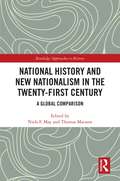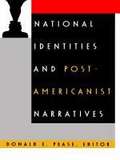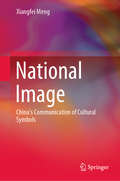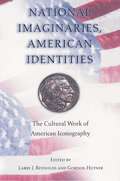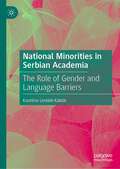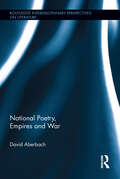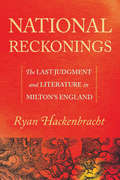- Table View
- List View
National 5 & Higher English: Scottish Short Texts
by Willie Mcguire Carolyn CunninghamThis title is endorsed by SQA.Shows students how they can enhance their writing skills and improve their National 5 grade, by detailing the basic Portfolio requirements and illustrating different writing forms that may be used.Writing skills in the Folio submission make up 30% of the marks in National 5 English, and this book has been written to show students how they can enhance those writing skills and improve their National 5 grade at the same time! As well as detailing the basic Folio requirements, the book explains and illustrates different writing forms that may be used, the 'writing process' and assessment criteria. Common errors - and how to avoid them - are illustrated, and suggested answers are also provided to typical tasks.- A completely authoritative one-volume guide to the Folio writing process, which makes up 30% of a candidate's grade at National 5- Written by a highly experienced examiner and setter- Provides practical, down-to-earth guidance for students about the 'writing process'
National 5 English: Practice Papers for SQA Exams
by Colin EckfordPractise for your SQA exams with three specially-commissioned Hodder Gibson Practice Exam Papers.- Practise with model papers written and checked by experienced markers and examiners- Get extra advice with specially-written study-skills guidance sections- Gain vital extra marks and avoid common mistakes with examiner tips
National Association of Broadcasters Engineering Handbook
by Garrison C. CavellThe NAB Engineering Handbook is the definitive resource for broadcast engineers. It provides in-depth information about each aspect of the broadcast chain from audio and video contribution through an entire broadcast facility all the way to the antenna. New topics include Ultra High Definition Television, Internet Radio Interfacing and Streaming, ATSC 3.0, Digital Audio Compression Techniques, Digital Television Audio Loudness Management, and Video Format and Standards Conversion. Important updates have been made to incumbent topics such as AM, Shortwave, FM and Television Transmitting Systems, Studio Lighting, Cameras, and Principles of Acoustics. The big-picture, comprehensive nature of the NAB Engineering Handbook will appeal to all broadcast engineers—everyone from broadcast chief engineers, who need expanded knowledge of all the specialized areas they encounter in the field, to technologists in specialized fields like IT and RF who are interested in learning about unfamiliar topics. Chapters are written to be accessible and easy to understand by all levels of engineers and technicians. A wide range of related topics that engineers and technical managers need to understand are covered, including broadcast documentation, FCC practices, technical standards, security, safety, disaster planning, facility planning, project management, and engineering management.
National Character in South African English Children's Literature (Children's Literature and Culture #41)
by Elwyn JenkinsThis is the first full-length study of South African English youth literature to cover the entire period of its publication, from the late nineteenth century to the early twenty-first century. Jenkins' book focuses on what made the subsequent literature essentially South African and what aspects of the country and its society authors concentrated on. What gives this book particular strength is its coverage of literature up to the 1960s, which has until now received almost no scholarly attention. Not only is this earlier literature a rewarding subject for study in itself, but it also throws light on subsequent literary developments. Another exceptional feature is that the book follows the author’s previous work in placing children’s literature in the context of adult South African literature and South African cultural history (e.g. cinema). He also makes enlightening comparisons with American, Canadian and Australian children’s literature.
National Conceptualisations of the Body Politic: Cultural Experience and Political Imagination (Cultural Linguistics)
by Andreas MusolffThis book presents the results of a large-scale experiment into interpretations of the metaphor “the Nation as a Body” among 1,800+ respondents from 30 linguistic and cultural backgrounds. In this first account of an empirical study of cross-cultural global metaphor interpretation of that scale, Musolff confirms that the meanings of metaphors are complex, culturally mediated and may differ for senders and recipients. The book provides a historical and cultural map of the traditions underlying differences in how the nation as a body – or, “the body politic” – is understood. Musolff challenges the hypotheses of the universality of “the nation” as a predominantly male-gendered and hierarchically organized concept and, in so doing, puts into question some of the key presuppositions of traditional historical and cognitive approaches to metaphor. For scholars and students of figurative language, the book lays out methodological foundations for cross-cultural metaphor comparison and reveals hidden meaning differences in political metaphor in English as lingua franca.
National Cultures and Foreign Narratives in Italy, 1903–1943
by Francesca BillianiNational Cultures and Foreign Narratives charts the pathways through which foreign literature in translation has arrived in Italy during the first half of the twentieth century. To show the contribution translations made to shaping an Italian national culture, it draws on a wealth of archival material made available in English for the first time.
National Dreams: The Remaking of Fairy Tales in Nineteenth-Century England
by Jennifer SchackerFairy tales and folktales have long been mainstays of children's literature, celebrated as imaginatively liberating, psychologically therapeutic, and mirrors of foreign culture. Focusing on the fairy tale in nineteenth-century England, where many collections found their largest readership, National Dreams examines influential but critically neglected early experiments in the presentation of international tale traditions to English readers. Jennifer Schacker looks at such wondrous story collections as Grimms' fairy tales and The Arabian Nights in order to trace the larger stories of cross-cultural encounter in which these books were originally embedded. Examining aspects of publishing history alongside her critical readings of tale collections' introductions, annotations, story texts, and illustrations, Schacker's National Dreams reveals the surprising ways fairy tales shaped and were shaped by their readers.Schacker shows how the folklore of foreign lands became popular reading material for a broad English audience, historicizing assumed connections between traditional narrative and children's reading. The tales imported and presented by such British writers as Edgar Taylor, T. Crofton Croker, Edward Lane, and George Webbe Dasent were intended to stimulate readers' imaginations in more ways than one. Fairy-tale collections provided flights of fancy but also opportunities for reflection on the modern self, on the transformation of popular culture, and on the nature of "Englishness." Schacker demonstrates that such critical reflections were not incidental to the popularity of foreign tales but central to their magical hold on the English imagination.Offering a theoretically sophisticated perspective on the origins of current assumptions about the significance of fairy tales, National Dreams provides a rare look at the nature and emergence of one of the most powerful and enduring genres in English literature.
National Geographic Reach for Reading: Language, Literacy, Content (Grade #4)
by Lada Kratky Nonie K. Lesaux Nancy FreyNational Geographic Reach: Language, Literacy, Content
by Deborah J. Short Sylvia Linan-Thompson Lada Kratky Nonie K. Lesaux Nancy Frey Jennifer D. TurnerNational Geographic Reach: Language, Literacy, Content (Grade 5)
by Lada Kratky Nonie K. Lesaux Nancy FreyNIMAC-sourced textbook
National Geographic Reach: Language, Literacy, Content [Grade 2]
by Lada Kratky Nancy Frey Nonie LesauxNIMAC-sourced textbook
National Geographic Reach: Language, Literacy, Content [Level D, Grade 3]
by Lada Kratky Nonie K. Lesaux Nancy FreyNIMAC-sourced textbook
National Geographic Reach: Language, Literacy, Content [Level E, Grade 4]
by Lada Kratky Nonie K. Lesaux Nancy FreyReach Lvl E TX Student Anthology
National Geographic Reach: Language, Literacy, Content [Level F, Grade 5]
by Lada Kratky Nonie K. Lesaux Nancy FreyReach Lvl F TX Student Anthology
National Geographic Reach: Languange, Literacy, Content
by Lada Kratky Nonie K. Lesaux Nancy FreyNIMAC-sourced textbook
National Geographic Reach: Student Anthology, Level E
by Lada KratkyThe Student Anthology features paired reading selections with exclusive National Geographic content. Built-in instructional support and activities are also included.
National Healing
by Claude HurlbertIn National Healing, author Claude Hurlbert persuasively relates nationalism to institutional racism and contends that these are both symptoms of a national ill health afflicting American higher education and found even in the field of writing studies. Teachers and scholars, even in progressive fields like composition, are unwittingly at odds with their own most liberatory purposes, he says, and he advocates consciously broadening our understanding of rhetoric and writing instruction to include rhetorical traditions of non-Western cultures.Threading a personal narrative of his own experiences as a student, professor, and citizen through a wide ranging discussion of theory, pedagogy, and philosophy in the writing classroom, Hurlbert weaves a vision that moves beyond simple polemic and simplistic multiculturalism. National Healing offers a compelling new aesthetic, epistemological, and rhetorical configuration.
National Healing: Race, State, and the Teaching of Composition (G - Reference, Information And Interdisciplinary Subjects Ser.)
by Claude HurlbertIn National Healing, author Claude Hurlbert persuasively relates nationalism to institutional racism and contends that these are both symptoms of a national ill health afflicting American higher education and found even in the field of writing studies. Teachers and scholars, even in progressive fields like composition, are unwittingly at odds with their own most liberatory purposes, he says, and he advocates consciously broadening our understanding of rhetoric and writing instruction to include rhetorical traditions of non-Western cultures. Threading a personal narrative of his own experiences as a student, professor, and citizen through a wide ranging discussion of theory, pedagogy, and philosophy in the writing classroom, Hurlbert weaves a vision that moves beyond simple polemic and simplistic multiculturalism. National Healing offers a compelling new aesthetic, epistemological, and rhetorical configuration.
National History and New Nationalism in the Twenty-First Century: A Global Comparison (Routledge Approaches to History #44)
by Thomas Maissen Niels F. MayNational history has once again become a battlefield. In internal political conflicts, which are fought on the terrain of popular culture, museums, schoolbooks, and memorial politics, it has taken on a newly important and contested role. Irrespective of national specifics, the narratives of new nationalism are quite similar everywhere. National history is said to stretch back many centuries, expressesing the historical continuity of a homogeneous people and its timeless character. This people struggles for independence, guided by towering leaders and inspired by the sacrifice of martyrs. Unlike earlier forms of nationalism, the main enemies are no longer neighbouring states, but international and supranational institutions. To use national history as an integrative tool, new nationalists claim that the media and school history curricula should not contest or question the nation and its great historical deeds, as doubts threaten to weaken and dishonour the nation. This book offers a broad international overview of the rhetoric, contents, and contexts of the rise of these renewed national historical narratives, and of how professional historians have reacted to these phenomena. The contributions focus on a wide range of representative nations from around all over the globe.
National Identities and Post-Americanist Narratives
by Donald E. PeaseNational narratives create imaginary relations within imagined communities called national peoples. But in the American narrative, alongside the nexus of belonging established for the national community, the national narrative has represented other peoples (women, blacks, "foreigners", the homeless) from whom the property of nationness has been removed altogether and upon whose differences from them the national people depended for the construction of their norms. Dismantling this opposition has become the task of post-national (Post-Americanist) narratives, bent on changing the assumptions that found the "national identity."This volume, originally published as a special issue of bounrary 2, focuses on the process of assembling and dismantling the American national narrative(s), sketching its inception and demolition. The contributors examine various cultural, political, and historical sources--colonial literature, mass movements, epidemics of disease, mass spectacle, transnational corporations, super-weapons, popular magazines, literary texts--out of which this narrative was constructed, and propose different understandings of nationality and identity following in its wake.Contributors. Jonathan Arac, Lauren Berlant, Robert J. Corber, Elizabeth Freeman, Kathryn V. Lingberg, Jack Matthews, Alan Nadel, Patrick O'Donnell, Daniel O'Hara, Donald E. Pease, Ross Posnock, John Carlos Rowe, Rob Wilson
National Image: China’s Communication of Cultural Symbols
by Xiangfei MengThis book introduces researchers, students and the general public to an intriguing phenomenon at the intersection of diverse fields: national branding. In particular, it uses representative cases particularly to show how China responded to major challenges, not only in the distant past, but also especially in our hectic age of national image construction. By pursuing an interdisciplinary, socio-historical approach, the book sheds new light on the role of cultural symbols in national image building. As such, readers will learn how China has exploited its “black-and-white” tradition – calligraphy and painting – in the construction of a national image.
National Imaginaries, American Identities: The Cultural Work of American Iconography
by Larry J. Reynolds & Gordon HutnerFrom the American Revolution to the present, the United States has enjoyed a rich and persuasive visual culture. These images have constructed, sustained, and disseminated social values and identities, but this unwieldy, sometimes untidy form of cultural expression has received less systematic attention than other modes of depicting American life. Recently, scholars in the humanities have developed a new critical approach to reading images and the cultural work they perform. This practice, American cultural iconography, is generating sophisticated analyses of how images organize our public life. The contributions to this volume exhibit the extraordinary scope and interpretive power of this interdisciplinary study while illuminating the dark corners of the nation's psyche. Drawing on such varied texts and visual media as daguerreotypes, political cartoons, tourist posters, and religious artifacts, these essays explore how pictures and words combine to teach us who we are and who we are not. They examine mimesis in elegant portraits of black Freemasons, industrial-age representations of national parks, and postwar photographs of atomic destruction. They consider how visual culture has described and disclosed the politics of racialized sexuality, whether subconsciously affirming it in the shadows of film noir or deliberately contesting it through the interethnic incest of John Sayles's Lone Star. Students of literature, film, and history will find that these essays extend the frontier of American studies. The contributors are Maurice Wallace, Dennis Berthold, Alan Trachtenberg, Shirley Samuels, Jenny Franchot, Cecelia Tichi, Eric Lott, Bryan C. Taylor, and José E. Limón.
National Minorities in Serbian Academia: The Role of Gender and Language Barriers
by Karolina Lendák-KabókThis book offers an intersectional analysis of secondary and tertiary educational pathways of ethnic Hungarians, Romanians and Slovaks in the Autonomous Province of Vojvodina, Serbia. After a detailed overview of the legal and institutional context of national minority education in Serbia, the book presents qualitative and quantitative research results to illuminate the often invisible linguistic and cultural barriers that national minority high school graduates, university students and faculty may encounter. The author also focuses on the position of national minority women in Serbian higher education and academia, shedding light on the very gendered nature of the ‘glass ceiling’ that often holds members of national minority communities back from career building. This book will be of interest to policymakers seeking nuanced interpretations of multifocal inequalities, as well as academics in fields such as gender studies, migration studies, minority languages and communities, and the sociology of education.
National Poetry, Empires and War (Routledge Interdisciplinary Perspectives on Literature)
by David AberbachNationalism has given the world a genre of poetry bright with ideals of justice, freedom and the brotherhood of man, but also, at times, burning with humiliation and grievance, hatred and lust for revenge, driving human kind, as the Austrian poet Grillparzer put it, ‘From humanity via nationality to bestiality’. National Poetry, Empires and War considers national poetry, and its glorification of war, from ancient to modern times, in a series of historical, social and political perspectives. Starting with the Hebrew Bible and Homer and moving through the Crusades and examples of subsequent empires, this book has much on pre-modern national poetry but focuses chiefly on post-1789 poetry which emerged from the weakening and collapse of empires, as the idealistic liberalism of nationalism in the age of Byron, Whitman, D’Annunzio, Yeats, Bialik, and Kipling was replaced by darker purposes culminating in World War I and the rise of fascism. Many national poets are the subject of countless critical and biographical studies, but this book aims to give a panoramic view of national poetry as a whole. It will be of great interest to any scholars of nationalism, Jewish Studies, history, comparative literature, and general cultural studies.
National Reckonings: The Last Judgment and Literature in Milton’s England
by Ryan HackenbrachtDuring the tumultuous years of the English Revolution and Restoration, national crises like civil wars and the execution of the king convinced Englishmen that the end of the world was not only inevitable but imminent. National Reckonings shows how this widespread eschatological expectation shaped nationalist thinking in the seventeenth century. Imagining what Christ's return would mean for England's body politic, a wide range of poets, philosophers, and other writers—including Milton, Hobbes, Winstanley, and Thomas and Henry Vaughan,—used anticipation of the Last Judgment to both disrupt existing ideas of the nation and generate new ones. Ryan Hackenbracht contends that nationalism, consequently, was not merely a horizontal relationship between citizens and their sovereign but a vertical one that pitted the nation against the shortly expected kingdom of God. The Last Judgment was the site at which these two imagined communities, England and ecclesia (the universal church), would collide. Harnessing the imaginative space afforded by literature, writers measured the shortcomings of an imperfect and finite nation against the divine standard of a perfect and universal community. In writing the nation into end-times prophecies, such works as Paradise Lost and Leviathan offered contemporary readers an opportunity to participate in the cosmic drama of the world's end and experience reckoning while there was still time to alter its outcome.
